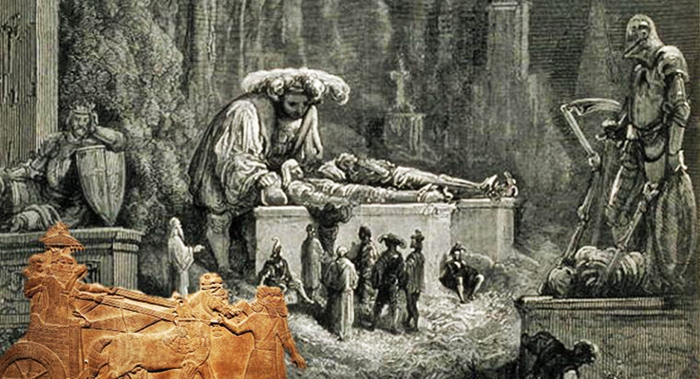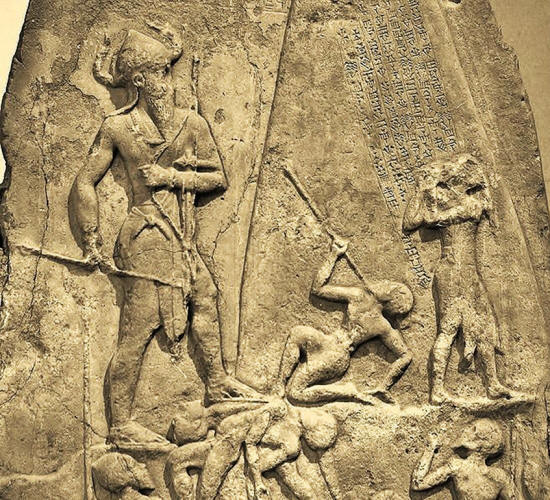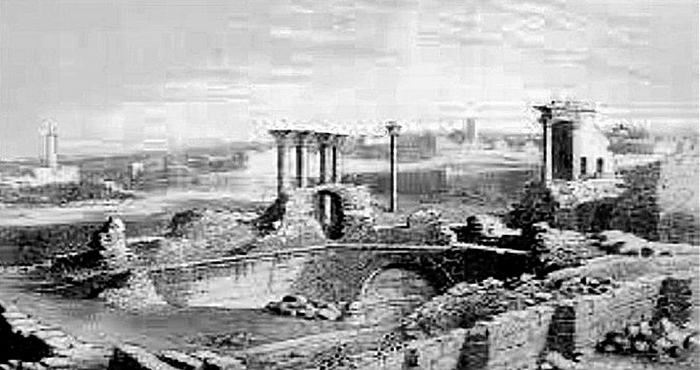|

by Ellen
Lloyd
November
25, 2020
from
AncientPages Website
Italian version

While many still dispute
the existence of
ancient giants there are
archaeologists who are convinced people of superhuman size built
several cities in the distant past.
Giants are frequently mentioned in myths, legends, and sacred texts,
but most modern scholars are reluctant to embrace the idea people
much taller than average man roamed the Earth thousands of years
ago.
It's puzzling to
see this negative attitude persists especially considering that we
do know giants are real. Known as the
Giant of Illinois,
Robert Pershing Wadlow was the
world's tallest man.
There are photos of
him, and many can testify they knew him personally.
So why does the
subject of ancient giants suddenly become so controversial
evoking emotions of anger?
Isn't it
obvious to assume giants existed in the past and they can still
be encountered today?
Giants Mentioned In The
Bible
In the Bible, we
find several references to ancient giants.
For example,
Joshua, who became the leader of the Israelite tribes after the
death of Moses mentions the
Gibborim in his chronicles.
The "Gibborim",
"heroes of old, men of renown", who are mentioned in Genesis 6,
were not as tall and powerful as
the Nephilim, but they were
nevertheless a dangerous warrior race.
It is said that
ancient Jericho was the city of giants and home to the mighty
Gibborim.

Victory Stele of Naram-Sin
celebrates the triumph of King Naram-Sin
over a mountain people, the Lullubi.
King Naram-Sin appears to be exceptionally tall.
"There were giants in the earth in
those days; and also after that, when the sons of God came in
unto the daughters of men, and they bare children to them, the
same became mighty men which were of old, men of renown."
(Genesis 6:4)
There are also a
number of Biblical stories dealing with the Rephaim, another group
of giants described as,
"a mighty
people with tall stature who lived in Canaan."
Another mysterious
race that is mentioned in the Bible are the little known
Didanum people, sometimes also called the Ditanu or
Tidanu.
The Didanum people
were the ancestors of the Nephilim and Rephaim.
From the Book
of Deuteronomy, the fifth book of the
christian Old Testament, where it is also known as the
Fifth Book of Moses we learn that giant King Og of Bashan
ruled over 60 cities built by the huge Rephaim.
Bashan is frequently mentioned
in the Bible.
It is the
northernmost region of the Transjordan, which is located in what
is today known as Syria.
Archaeologists who
have examined the ruins found in this region can say with certainty
these cities were not constructed by people similar to modern man.
Ancient Cities of Bashan
Were Built By Giants
In his book, The
Ancient Bashan and the Cities of Og, Cyril Graham writes
that,
"the streets
are perfect, the walls perfect and what seems more astonishing,
the stone doors are still hanging on their hinges…
Some of these
gates are large enough to admit of a camel passing through them,
and the doors are of proportionate dimensions, some of the
stones of which they are formed being eighteen inches in
thickness.
The roofs also
are formed of huge stone labs resting on the massive walls.
All betoken the
workmanship of a race endowed with powers far exceeding those of
ordinary men; and [all] give credibility to the supposition that
we have in them dwellings of the giant race that occupied that
district before it was invaded by the Israelites."
Graham points out
that the houses in the cities of Bashan were,
"built of such
huge and massive stones that no force which can be brought
against them in that country could ever batter them down."

Many ancient cities were built
by Biblical giants.
Credit: Public Domain
Rev. J.L.
Porter who also visited the ancient, ruined cities of Bashan,
agrees with Graham and thinks these cities were built by the mighty
Rephaim.
In his book, The
Giant Cities of Bashan and Syria's Holy Places, Porter writes:
"Moses makes
special mention of the strong cities of Bashan, and speaks of
their high walls and gates.
He tells, us,
too in the same connection, that Bashan was called the land of
the Giants (or Rephaim, Deut. Iii 13), leaving us to conclude
that the cities were built by giants.
Now the houses
of Kieroth and the other towns in Bashan appear to be just such
dwellings as a race of giants would build.
The walls, the
roofs, but especially the ponderous gates, doors, and bars, are
in a way characteristic of a period when architecture was in its
infancy, when giants were mason and when the strength and
security were the grand requisites."
During his visit to
Kerioth in Israel, Rev. Porter
measured one of these ancient doors.
It was,
"nine feet
high, four and a half feet wide, and ten inches thick."
The archaeological
evidence that can be found in Bashan certainly speaks in favor of
the ancient giants who seem to have been erased from the pages of
history.
References
|




